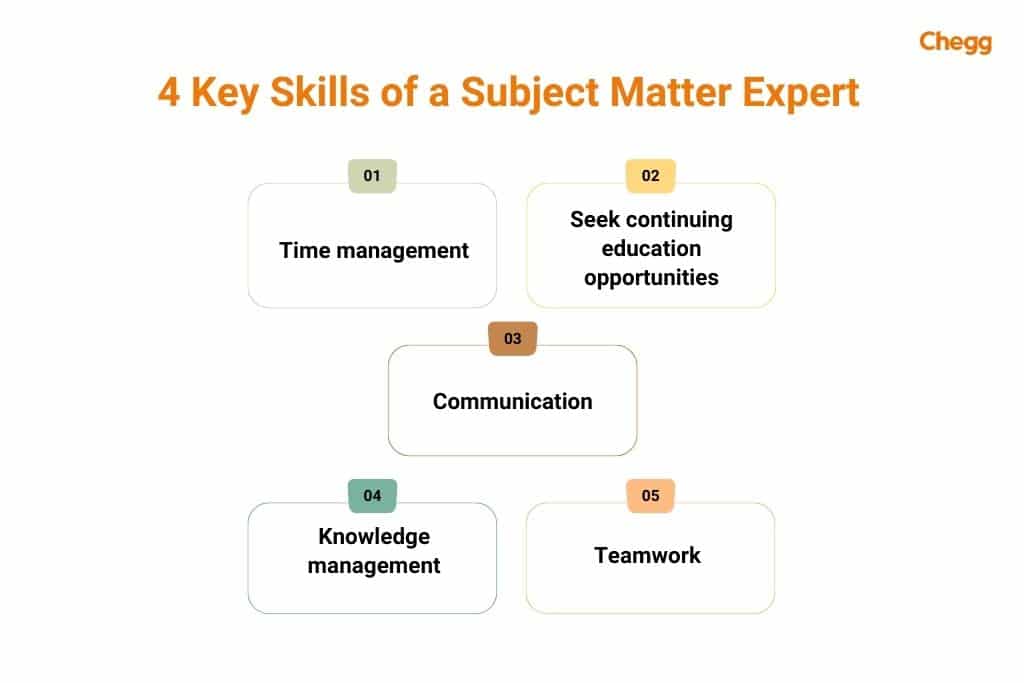
Quick Summary
Table of Contents
In today’s busy world, businesses and organizations need experts to help them. A Subject Matter Expert (SME) is very important for making sure work is done well in different fields. But what does a Subject Matter Expert do? This guide will explain everything about SMEs, including what they do, their duties, the skills they need, and the job opportunities available for them.
A Subject Matter Expert (SME) is a professional who has extensive knowledge and experience in a specific area or field. They are recognized as authorities in their domain and are often called upon to provide expert advice, solve complex problems, and ensure the accuracy and quality of work related to their expertise.
A Subject Matter Expert (SME) is a professional who has deep knowledge and experience in a specific field. Their main job is to provide expert advice, solve complex problems, and make sure that projects are accurate and high-quality. SMEs help businesses, organizations, and teams by sharing valuable insights, improving processes, and making informed decisions. They are often involved in training, creating content, and checking the quality of work to maintain high standards. Whether in IT, healthcare, finance, or any other industry, SMEs play a key role in ensuring success.
Organizations like Chegg India hire freelance Subject Matter Experts. These experts sign up on the website or are hired from campuses. They answer questions related to a specific subject posted by students from around the world and get paid for each question they answer. The average salary for a Subject Matter Expert is between ₹30,000 – ₹80,000 per month, and ₹2.4 Lakhs – ₹24 Lakhs per year.
Understanding what does a Subject Matter Expert do is essential as SMEs are recruited across various fields and industries where specialized knowledge is vital. Their roles and responsibilities vary depending on the industry and organizational needs. Here are some examples of how SMEs contribute in different areas:
In understanding what does a Subject Matter Expert do, SMEs are highly valued for their in-depth knowledge, experience, and ability to offer insights that aid in decision-making, problem-solving, and driving innovation within their respective fields.

A Subject Matter Expert (SME) plays a crucial role in various industries by providing specialized knowledge and expertise. But what does a Subject Matter Expert do? Here are some key responsibilities of an SME, explained in detail:
By fulfilling these responsibilities, SMEs ensure that projects are completed successfully and meet the highest standards of quality and accuracy. Their expertise is invaluable in guiding teams and organizations towards achieving their goals. Whether in education, healthcare, manufacturing, or any other field, SMEs play a vital role in ensuring success. So, what does a Subject Matter Expert do? They provide the specialized knowledge and skills needed to drive projects forward and achieve excellence.
Subject Matter Experts (SMEs) are highly valued for their specialized knowledge and expertise in specific fields. But what does a Subject Matter Expert do? To excel in their roles, SMEs need to possess a variety of skills. Here are some essential skills for SMEs:

SMEs must have extensive knowledge in their area of expertise. This includes understanding the latest trends, technologies, and best practices. For example, an SME in technology should be well-versed in the latest software development methodologies and tools.
SMEs need to analyze complex information and data to provide accurate insights and solutions. This involves critical thinking and problem-solving abilities. For instance, an SME in finance must be able to analyze financial statements and market trends to make informed recommendations.
Effective communication is crucial for SMEs. They must be able to convey complex information clearly and concisely to different audiences, including team members, stakeholders, and clients. This includes both written and verbal communication skills
SMEs should be adept at conducting thorough research to stay updated on the latest developments in their field. This helps them provide the most current and relevant information. For example, an SME in healthcare needs to keep up with the latest medical research and treatments
SMEs often work with various teams to achieve project goals. They need to collaborate effectively, share their expertise, and support team members. This involves being a good listener and being open to feedback
Accuracy is critical for SMEs. They must pay close attention to details to ensure that all information and deliverables are correct and meet the required standards. This is especially important for roles that involve compliance and quality assurance
The ability to adapt to changing circumstances and new information is essential for SMEs. They must be flexible and open to learning new skills and technologies. This is particularly important in fast-paced industries like technology and finance
SMEs often play a role in training and mentoring others. They need to be able to teach and guide team members, helping them develop their skills and knowledge. This is a key part of subject matter expert skills
While not always a primary responsibility, having project management skills can be beneficial for SMEs. They need to understand project timelines, resource allocation, and deliverable tracking to ensure successful project completion
SMEs must adhere to ethical standards and practices in their field. This includes maintaining confidentiality, avoiding conflicts of interest, and ensuring that their advice and actions are in the best interest of their organization and clients
By developing and honing these skills, SMEs can effectively fulfill their roles and contribute to the success of their organizations. Whether you are an SME in education, healthcare, technology, or any other field, these skills are essential for providing valuable insights and expertise.
Subject Matter Experts or SMEs are in high demand in the current market scenario, and Chegg is hiring PAN India. A simple registration process provides email and mobile numbers followed by giving a simple subject test and guidelines test. It is a well-paying, rewarding, and satisfying profession that has flexible work hours and can be done on a part-time basis. It enables you to earn while you learn and also gives you exposure to working in an MNC culture.
So, if you are a committed learner and are dedicated to helping people answer their questions and doubts answered with your knowledge, signing up as a Chegg Subject Matter Expert is an excellent choice!
We hope we made clarity on the subject matter expert roles and responsibilities and what does a subject matter expert do?

Yes, being a subject matter expert is a good career. SMEs are highly valued for their specialized knowledge and expertise, which can lead to well-paying jobs, job security, and opportunities for career advancement.
To become a subject matter expert, gain deep knowledge in a specific field through education, professional experience, and continuous learning. Building a strong reputation and demonstrating expertise through projects and publications can help you become recognized as an SME.
A subject matter expert (SME) provides specialized knowledge and advice in a specific area, helping with decision-making, content creation, and project support.
Key skills for a subject matter expert include deep knowledge in their field, strong analytical abilities, excellent communication, problem-solving, and the ability to provide clear and actionable insights.
A person qualifies as a subject matter expert if they have extensive knowledge, experience, and expertise in a particular area, often demonstrated through advanced education, professional experience, and recognition by peers.
In India, the salary for an SME (Subject Matter Expert) typically ranges from ₹6,00,000 to ₹15,00,000 per year, depending on the industry, experience, and expertise level. Senior SMEs in specialized fields may earn even more.
A Subject Matter Expert (SME) is a professional with deep knowledge and experience in a specific field. They provide expert advice, solve complex problems, and ensure the accuracy and quality of work related to their expertise.

Authored by, Amay Mathur | Senior Editor




Amay Mathur is a business news reporter at Chegg.com. He previously worked for PCMag, Business Insider, The Messenger, and ZDNET as a reporter and copyeditor. His areas of coverage encompass tech, business, strategy, finance, and even space. He is a Columbia University graduate.
Editor's Recommendations
Chegg India does not ask for money to offer any opportunity with the company. We request you to be vigilant before sharing your personal and financial information with any third party. Beware of fraudulent activities claiming affiliation with our company and promising monetary rewards or benefits. Chegg India shall not be responsible for any losses resulting from such activities.
Chegg India does not ask for money to offer any opportunity with the company. We request you to be vigilant before sharing your personal and financial information with any third party. Beware of fraudulent activities claiming affiliation with our company and promising monetary rewards or benefits. Chegg India shall not be responsible for any losses resulting from such activities.